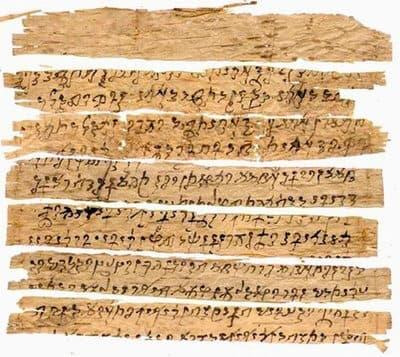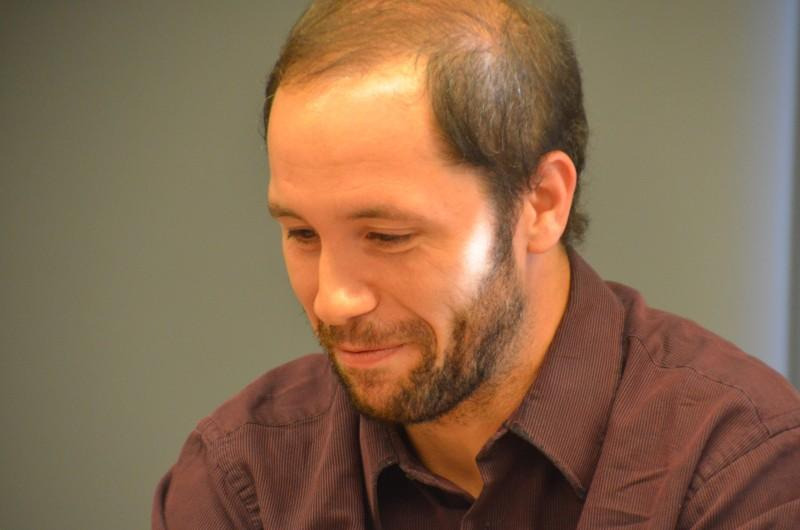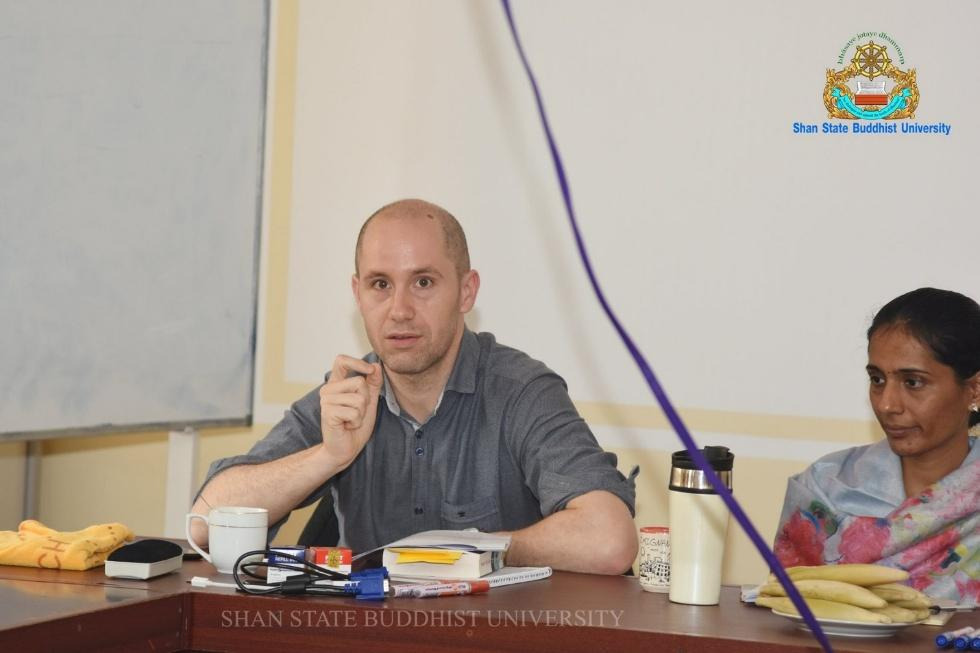The Dharma-Gaia Foundation, in collaboration with the Universitat Autònoma de Barcelona, is pleased to announce the opening of registrations for the course “Introduction to Pali Language and Literature: Deepening Syntax and Text Reading” (Pali III). With this course we reached the third level of the four that constitute our comprehensive program of studying the Pali language, giving continuity to previous courses: “Introduction to Pali Language and Literature — the language of primitive Buddhist texts” (“Pali I”) and “Introduction to Pali Language and Literature. Advanced Concepts” (“Pali II”).

Course content
This third level expands the themes and scope of previous courses, focusing its focus on deepening syntax and reading texts. Although it represents a continuation in terms of contents and objectives, this new course is independent when it comes to enrollment. It is not necessary to have completed the previous levels to be accepted, although it is recommended to have sufficient knowledge of Pali to follow it successfully.
Under the direction of Professor Aleix Ruiz Falqués, the course offers an immersion in the Pali language, where students will delve into aspects of the grammar and stylistics of this language, mainly based on the reading of original Buddhist texts. The different types of verbs will be explored, complex nominal compounds will be analyzed and the analysis of the compound sentence will be consolidated, both in its form and in its stylistic function. This practical and theoretical approach will allow participants to appreciate not only the language, but also the rich cultural and spiritual heritage it entails.
Objectives of the course:
Deepening the Pali syntax: identification and use of advanced syntactic structures.
Critical reading of texts: direct work with selected excerpts from the Pali canon and traditional commentaries.
Exploring Buddhist Concepts: understanding of the philosophical, ethical and spiritual principles of early Buddhism.
Development of practical tools: use of dictionaries, grammars and digital platforms for the autonomous study of Pali.
Course details:
Study code: 5276/1
Credits: 4 ECTS
Duration: The course will take place from January 9 to July 10, 2026, with a total duration of 25 teaching hours.
Modality: The classes will be held in a completely online format, allowing great flexibility for students from different places.
Schedule: The sessions will be held once a week, on Friday from 17:00 to 18:00 hours (Peninsular Spanish time).
Recordings: To ensure maximum accessibility, all sessions will be recorded and will be available in a deferred format.
Available places: The course admits a maximum limited number of 18 seats, which will be assigned in strict order of registration. Therefore, we recommend that interested parties formalize their registration as soon as possible to secure their place in the course.
Orientation: Professional
Teaching language: Castilian
Enrollment: The cost of tuition is 120€, and includes access to additional materials, recordings and resources.
Registration sheet: Click hither
Admission requirements:
Participants must have completed secondary education and have prior knowledge of the Pali language to enable them to follow the course content. Although it is not essential to have completed previous courses, students are expected to have sufficient knowledge of Pali to be able to make the most of this learning experience.
Certification:
At the end of the course, a certificate of achievement to participants who successfully complete the course, endorsed by the Universitat Autònoma de Barcelona, which can be a valuable addition to their academic and professional curriculum. The cost of this certificate is not included in the price of registration.
Why study Pali?
Pali is a key language for the study of Theravāda Buddhism, since it preserved the Pali canon, one of the oldest and most complete collections of the teachings attributed to the Buddha. Learning Pali allows direct access to these fundamental texts, enriching the understanding of their philosophical, ethical and spiritual principles.
This course is ideal for:
- Students and researchers interested in Buddhist, linguistic or Asian studies.
- Meditation or Buddhism practitioners who wish to deepen the original teachings.
- People curious about classical languages and their connection with philosophy and literature.
- Those looking for rigorous and accessible academic training in this ancient language.
Career opportunities:
Students who complete this training will have the opportunity to dedicate themselves to teaching and academic research in Asian studies, to work on the translation and interpretation of classical languages such as Pali, to offer cultural consulting to organizations that operate on issues related to Asian cultures, and to collaborate with museums and archives that have collections of Asian art and literature.

About the teacher
Aleix Ruiz Falqués holds a doctorate in South Asian Studies from the University of Cambridge and has an outstanding academic career in the field of Pali language and literature. His training includes Sanskrit studies at the University of Pune and a doctorate specialized in the Pali grammatical tradition of Burma, giving him a unique and profound perspective in this field. His pedagogical approach combines academic rigor with a deep appreciation for the Buddhist tradition, facilitating the understanding of Pali texts in their historical, literary and philosophical context.
Among his most outstanding works is the Pali translation into Spanish of the anthology In the words of the Buddha (Kairos, 2019), as well as the translation of The last days of the Buddha [Mahāparinibbānasutta], with the commentary of Buddhaghosa (Madrid: Trotta, 2022). Your translation of Questions to King Milinda (Kairos). In addition, he has published numerous articles specialized in Pali studies in international academic journals. His work also includes the editing and critical translation of classical texts, and studies on Pali Burmese literature and its exegetical traditions.
Thanks to his deep knowledge of the Pali language and his experience as a translator and academic, Aleix is able to transmit the philosophical, literary and cultural nuances of the original texts. Their solid training and prolific intellectual output guarantee course participants a rigorous, enriching and profoundly inspiring learning experience.
Scholarships and grants:
For those interested in exploring financial support options, it is recommended to consult the information on scholarship and grant possibilities on the UAB scholarships, grants and calls page.
Personalized attention:
The course offers personalized attention to help students in their learning process. Participants can contact the teaching team to answer questions and receive additional guidance during the course development.
Responsible centers:
Faculty of Translation and Interpretation of the Autonomous University of Barcelona.
Contact:
Gustavo Pita Céspedes
Telephone: +34 93 586 8901
Email: gustavo.pita@uab.cat

About the organizing institutions:
We invite all interested parties to enroll in this course and take advantage of this exceptional opportunity to enrich their knowledge and understanding of Pali. Don't miss this opportunity to learn from an expert and to immerse yourself in the fascinating world of Pali!
We look forward to your participation in this journey of learning and discovery!
Useful links:
Faculty of Translation and Interpretation of the Autonomous University of Barcelona
Articles published in Buddhistdoor in Spanish
”The situation of Buddhist studies in Spain: educational programs” by Juan Arnau Navarro, Montse Castellà Olivé, Francisco Díez de Velasco, Ricardo Guerrero Diáñez, Basili Llorca Martínez, Daniel Millet Gil, Agustín Pániker Vilaplana, Aleix Ruiz Falqués, Jaume Vallverdú Vallverdú, Abraham Vélez de Cea.
”Presentation of the book In the words of the Buddha. An Anthology of Discourses from the Pali Canon, by Bhikkhu BodhI” by Caridad Martin Nieto.
Other related articles published in Buddhistdoor in Spanish
”The expansion of Buddhist studies through the study of Pali: an interview with Aleix Ruiz Falqués” by Dipen Barua and Daniel Millet.
“The Dunhuang Diamond” by Aleix Ruiz-Falqués
”Of free nuns and unfaithful translators” by Aleix Ruiz-Falqués
”Saraṇa Vihāra: a refuge in the Montseny Massif” by Aleix Ruiz-Falqués
Key Publications in Spanish-Speaking Buddhist Studies
Buddhist Studies in Latin America and Spain (Volume I), edited by Daniel Millet Gil and Jaume Vallverdú Vallverdú. This first volume brings together a series of essays that explore the relationship between Buddhism and Spanish-American culture, addressing issues such as the reception of Buddhism in Latin America and Spain, the translations of Buddhist texts into Spanish and the impact of Buddhism on contemporary societies.
The course is the result of a collaboration between the Universitat Autònoma de Barcelona (UAB), one of the most prestigious universities in Europe, and the Dharma-Gaia Foundation, dedicated to the dissemination of Buddhism and the preservation of its cultural heritage., edited by Daniel Millet Gil and Jaume Vallverdú Vallverdú. The second volume expands the focus of the first, including contributions that analyze Buddhism from interdisciplinary and regional perspectives, with an emphasis on its interaction with local cultural traditions and its impact on the academic environment.
Both volumes are available in PDF format and can be downloaded free of charge through the following links First volume and Second volume
*This article has been published simultaneously on the website of Buddhistdoor in Spanish.










